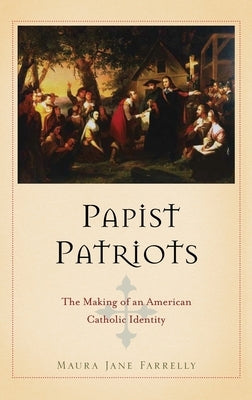1
/
of
1
Oxford University Press, USA
Papist Patriots: The Making of an American Catholic Identity
Papist Patriots: The Making of an American Catholic Identity
Regular price
$56.00 USD
Regular price
Sale price
$56.00 USD
Shipping calculated at checkout.
Quantity
Couldn't load pickup availability
The persons in America who were the most opposed to Great Britain had also, in general, distinguished themselves by being particularly hostile to Catholics. So wrote the minister, teacher, and sometime-historian Jonathan Boucher from his home in Surrey, England, in 1797. He blamed old
prejudices against papists for the Revolution's popularity - especially in Maryland, where most of the non-Canadian Catholics in British North America lived. Many historians since Boucher have noted the role that anti-Catholicism played in stirring up animosity against the king and Parliament. Yet, in spite of the rhetoric, Maryland's Catholics supported the independence movement more enthusiastically than their Protestant neighbors. Not only did
Maryland's Catholics embrace the idea of independence, they also embraced the individualistic, rights-oriented ideology that defined the Revolution, even though theirs was a communally oriented denomination that stressed the importance of hierarchy, order, and obligation. Catholic leaders in
Europe made it clear that the war was a sedition worthy of damnation, even as they acknowledged that England had been no friend to the Catholic Church. So why, then, did papists become patriots? Maura Jane Farrelly finds that the answer has a long history, one that begins in England in the early seventeenth century and gains momentum during the nine decades preceding the American Revolution, when Maryland's Catholics lost a religious toleration that had been uniquely theirs in the
English-speaking world and were forced to maintain their faith in an environment that was legally hostile and clerically poor. This experience made Maryland's Catholics the colonists who were most prepared in 1776 to accept the cultural, ideological, and psychological implications of a break from
England.
Author: Maura Jane Farrelly
Publisher: Oxford University Press, USA
Published: 01/06/2012
Pages: 324
Binding Type: Hardcover
Weight: 1.20lbs
Size: 9.30h x 6.10w x 1.10d
ISBN: 9780199757718
Review Citation(s):
Choice 08/01/2012
prejudices against papists for the Revolution's popularity - especially in Maryland, where most of the non-Canadian Catholics in British North America lived. Many historians since Boucher have noted the role that anti-Catholicism played in stirring up animosity against the king and Parliament. Yet, in spite of the rhetoric, Maryland's Catholics supported the independence movement more enthusiastically than their Protestant neighbors. Not only did
Maryland's Catholics embrace the idea of independence, they also embraced the individualistic, rights-oriented ideology that defined the Revolution, even though theirs was a communally oriented denomination that stressed the importance of hierarchy, order, and obligation. Catholic leaders in
Europe made it clear that the war was a sedition worthy of damnation, even as they acknowledged that England had been no friend to the Catholic Church. So why, then, did papists become patriots? Maura Jane Farrelly finds that the answer has a long history, one that begins in England in the early seventeenth century and gains momentum during the nine decades preceding the American Revolution, when Maryland's Catholics lost a religious toleration that had been uniquely theirs in the
English-speaking world and were forced to maintain their faith in an environment that was legally hostile and clerically poor. This experience made Maryland's Catholics the colonists who were most prepared in 1776 to accept the cultural, ideological, and psychological implications of a break from
England.
Author: Maura Jane Farrelly
Publisher: Oxford University Press, USA
Published: 01/06/2012
Pages: 324
Binding Type: Hardcover
Weight: 1.20lbs
Size: 9.30h x 6.10w x 1.10d
ISBN: 9780199757718
Review Citation(s):
Choice 08/01/2012
About the Author
Maura Jane Farrelly is Assistant Professor of American Studies at Brandeis University, where she also directs the Journalism Program. She received her PhD in History from Emory University. For seven years, she worked as a full-time reporter, first for Georgia Public Radio in Atlanta and then for the Voice of America in Washington, DC, and New York. She has also freelanced for NPR, PRI, and the BBC.
This title is not returnable
Share


